- Home
- T. Kingfisher
The Wonder Engine
The Wonder Engine Read online
The Wonder Engine
Book Two of the Clocktaur War
T. Kingfisher
This is a work of fiction. Any resemblance to persons, places, plants, poets, events, or actual historical personages, living, dead, or trapped in a hellish afterlife is purely coincidental.
* * *
Copyright 2018 Ursula Vernon
* * *
All Rights Reserved
* * *
Published in the United States by Red Wombat Tea Company
Artwork by Ursula Vernon
Praise for Clockwork Boys
“Hands down, probably the best piece of traditionally western epic fantasy I've read ever.” —Cassandra Khaw, author of Hammers on Bone
* * *
“Fun, lots of action and over way too soon…” —Camestros Felapton
* * *
“Clockwork Boys by T. Kingfisher—the pen-name of the Hugo-Award-winning Ursula Vernon—is really fun, and strangely difficult to describe.” — Tor.com
For Andrea and her long-suffering canine compatriot, Nemo
Contents
Prologue
Chapter 1
Chapter 2
Chapter 3
Chapter 4
Chapter 5
Chapter 6
Chapter 7
Chapter 8
Chapter 9
Chapter 10
Chapter 11
Chapter 12
Chapter 13
Chapter 14
Chapter 15
Chapter 16
Chapter 17
Chapter 18
Chapter 19
Chapter 20
Chapter 21
Chapter 22
Chapter 23
Chapter 24
Chapter 25
Chapter 26
Chapter 27
Chapter 28
Chapter 29
Chapter 30
Chapter 31
Chapter 32
Chapter 33
Chapter 34
Chapter 35
Chapter 36
Chapter 37
Chapter 38
Chapter 39
Chapter 40
Chapter 41
Chapter 42
Chapter 43
Chapter 44
Chapter 45
Chapter 46
Chapter 47
Chapter 48
Chapter 49
Chapter 50
Chapter 51
Chapter 52
Chapter 53
Chapter 54
Chapter 55
Acknowledgments
Also by T. Kingfisher
Prologue
Slate is a thief who specialized in stealing, forging, and planting paperwork. When she is arrested for treason, she finds herself part of a suicide mission with
Brenner the assassin and the disgraced paladin Caliban, once a demonslayer, now host to the dead remains of the demon which sent him on a murderous rampage and shattered his world.
Their goal is both simple and nearly impossible. Find a way to stop the Clockwork Boys, the massive, alien ivory creatures wreaking ruin upon the countryside. Fail, and crude magical tattoos will devour them.
Accompanied by the brilliant but sheltered scholar, Learned Edmund, the trio evaded the Clockwork Boys, only to be captured by rune, murderous deer-people led by an ancient demon. Slate, never the most likely of heroes, somehow rescued her friends and made an unlikely ally—a small, peculiar badger-creature named Grimehug.
In their flight from the deer-people, they discovered a wonder-engine, a strange, cryptic device that none of them were able to use. Learned Edmund knew of other such devices, but the expert is Brother Amadai, a vanished scholar of his brotherhood, last seen in Anuket City.
Anuket City is where the Clockwork Boys originate from. It is also the place where Slate herself lived until she angered the wrong people and had to flee.
Now Slate and her friends have reached Anuket City, and what lies within its clockwork gates will prove more terrible than anything they could have anticipated…
One
The first thing they saw when they got into Anuket City was a corpse.
The body of a gnole swung ghoulishly from a lamppost, head cocked at an impossible angle, paws dangling limply. A crowd had gathered beneath the unfortunate creature, but they were already starting to disperse when the five of them and the string of mules rode through the city gates.
“My god!” said Learned Edmund, his fingers flicking in a benediction.
Its coat of rags had been ripped off, and somehow that seemed the saddest thing to Slate. The body underneath was scrawny and hunched, the ribs straining visibly against the skin. It had a stub of a tail, and the thick badger stripes across its head ran down its back, clear to the base of the spine.
“Why would they do this?” asked Caliban. He looked around. “Why didn’t the Watch stop this?”
“Maybe it was a criminal,” said Brenner.
Strangely it was Grimehug who seemed the least bothered by the sight. “It happens. Some gnole gets in the wrong place, wrong time, humans get crazy, string some gnole up, you know?” He shrugged.
“This happens frequently?” asked Caliban.
“Often enough, big man.”
“And you stay here anyway?”
“Where else is a gnole gonna go?” He spread his hands, rags flapping. “Humans here, wild boars over there. Maybe a clocktaur steps on a gnole. Maybe a gnole starves. Something bad everywhere a gnole goes.”
“Something should be done,” insisted Caliban.
“One crusade at a time, paladin,” said Brenner. “Let’s find somewhere to stay.”
It rapidly became obvious that Anuket City was different from the Dowager’s capitol, and not just because it was a city-state instead of merely a city.
No one tried to stop them from entering the city. The guards looked bored.
“I expected it to be harder to get in,” murmured Caliban.
“Why would it?” asked Slate. “They want you to come in and spend as much money as possible.”
“They’re at war.”
“Which means the other city needs to worry about keeping them out. The war’s happening miles away and there are no human soldiers from this side. Most of the citizens probably don’t even notice it’s happening.”
“Still,” said Caliban.
They were less than twenty feet from the entrance to the city when a woman walked by, her eyes vague and distant, surrounded by a cloud of hummingbirds on tiny jeweled leashes. They darted around her in bright, erratic zig-zags, occasionally hovering to sip nectar from flowers in her hair. Her face was beautiful, but as she passed them, they saw her pupils vastly dilated and her mouth slack.
“You see why no one noticed us,” said Slate.
“This place is weird,” said Brenner, as he watched the hummingbird woman leave.
Slate glanced over at her companions. In another city, they might indeed look strange, if not individually then certainly as a group.
Brenner was wiry and slouched a lot, which made him look shorter than he actually was. He had long, ragged dark hair and shaggy eyebrows. You could easily overlook Brenner in a crowd, which was useful for someone who killed people for a living.
There was no overlooking former Knight-Champion Caliban. He did not slouch. He was tall, blond, and had the sort of face that people stamped on coins and immortalized in marble. He wore leather and chain armor and an undyed tabard that was, it had to be said, much the worse for wear. (It had been pelted with owl pellets approximately an hour earlier.) The massive sword on his back was made for killing demons. It looked very impressive, since hardly anyone realized that most demons
possessed farm animals.
Caliban caught her look and gave her a quizzical smile. Slate shrugged at him and looked away. That smile haunted her, at least during the brief periods of time when she didn’t want to bash his head in with a brick for being so relentlessly knightly.
Slate herself would have been overlooked even if she wasn’t standing next to Caliban. Dark brown hair, medium brown skin, colorless clothes. She had worked for thirty years to become invisible and most days she managed it very well indeed. In her line of work, it did not pay to stand out.
All three of them shared one physical trait in common. On their left arms, painted teeth sunk into the skin, was a crude tattoo of a scowling face.
Slate scratched absently at hers. The tattoo had had very strong opinions about her rescue of the other night. It had torn a jagged line across her bicep that had scabbed over now, but Slate knew that it would leave a scar.
Which hardly matters, does it? None of us expect to survive this experience. Well, no one but Learned Edmund…
The designated survivor was a slender, pleasant-faced young scholar. He wore the ink-stained robes of a dedicate of the Many-Armed God, which would attract respect and dread in equal measure. Respect, because the Many-Armed God only took the most brilliant scholars in His temples. Dread because they were also notoriously difficult to work with.
And then, of course, there was Grimehug, the gnole. She’d pulled him out a village of murderous deer-people and he had adopted her in turn. Slate wondered if the odd little badger-creature would stick around, or if he would vanish into the city now that they had returned.
She rather hoped he’d stay. She’d gotten used to having him asleep at the foot of her bedroll. He was warm and solid and didn’t wake up when she had an allergy attack in the middle of the night, which gave him points over her ex-husband.
Still, Anuket City is where Grimehug lives. He’s coming home.
I suppose, when you think about it, so am I.
For Slate, the memories coming back were a strange mixture. She was oddly proud of the strangeness of the city—she had lived here for seven years, she had survived—but under that was a gnawing sense of fear.
They were all still here.
Boss Horsehead, still here. The Shadow Market, still here.
All the old chickens, looking for a place to roost.
“Well,” she said. “Well.” She adjusted her hat, pulling it low over her eyes. No sense being obvious. No sense being too obviously disguised, either. Her greatest asset was that nobody in their right mind had ever expected her to come back. “Welcome to Anuket City.”
Two
They left the horses at a stable just outside of town. Slate was in no way sad to see hers go. It seemed unlikely that she would see the horse again.
Hopefully it’ll find someone who doesn’t sit on it like a sack of wet bricks.
“Good riddance,” muttered Brenner. “Never getting on one of those beasts again.”
“How do you propose to leave the city, then?” asked Caliban, amused. “Assuming we do?”
“On a sedan chair carried by voluptuous maidens.”
“Voluptuous maidens with very strong backs,” said Slate.
“Best kind, darlin’.”
Learned Edmund made a small sound of moral pain.
Finding an inn proved more problematic than the stable. There were plenty of inns and plenty of vacancies, but one of their number wasn’t welcome.
“No gnoles,” said the innkeeper.
“He’s with us.”
“No gnoles.”
Slate dropped another coin on the counter. “I said, he’s with us.”
“I said, no gnoles.”
Three more coins hit the counter.
“Look, lady,” said the innkeeper, sounding tired rather than annoyed, “you can stack coins to the rafters, and the answer is still no. It’s a health issue. No lepers, no public privies, and no gnoles!”
“What? Why not?” Slate’s hand went out to rest on Grimehug’s head.
“They carry werkblight.” He frowned over the counter. “I hope you wash your hands after you touch that one.”
“Werkblight? What’s werkblight?”
“Goddamn, you’re not from around here.” The innkeeper made shooing gestures. “It’s a disease. You’ll know it when you see it, believe me.”
“Sorry,” said Slate. “I did live here once, but that was five, six years ago.”
“Just missed them, then,” said the innkeeper. “Lucky you. Little blighters were everywhere one day, and the werkblight broke out not long after. Now get out of here, and take your gnole with you.”
“Jerk,” muttered Slate.
“Do you carry werkblight?” asked Brenner, once they were back out on the street.
“Brenner!”
“What? You’d rather I didn’t ask?”
Grimehug grinned. “Good question, dark man. Don’t think so. Don’t know. Gnoles don’t get sick from it. Never touch werkblight though, leave that for grave-gnoles.”
“What does it look like, this werkblight?” asked Learned Edmund. “Is it anything like the blight back in the capitol?”
“Don’t know. Never seen your blight.” Grimhug shrugged. “Stay in Anuket City, you’ll see werkblight soon enough. Don’t be touching it.”
They tried three more inns. None of them would take gnoles for any amount of money, and one threw her out for even suggesting it.
After that, she stopped asking. Instead she called a halt on the street, in a square lined with statues. She and Brenner stood under a battered statue of a winged lion, and put their heads together. Their fingers flickered in small, descriptive gestures that Caliban couldn’t even begin to follow.
“Backdoor?”
“Too much traffic.”
“Balcony?”
“Garden.”
“With drainpipes.”
“Doable.”
The two separated, nodded to each other, and Slate turned to the other two.
“Wait here.” She spun on her heel.
“But—”
He was too late. Brenner had already melted into the crowd. Caliban tried to keep his eyes on Slate and lost her within a dozen heartbeats. The square was fairly crowded at this time of day, but it was still uncanny.
Priest and paladin were left standing under the lion statue. The gnole plopped down at their feet.
“Well,” said Learned Edmund. “I suppose we wait.”
“I suppose we do.” Caliban had an intense desire for a hot bath. This did not mean anything in and of itself, because Caliban had wanted a hot bath for weeks now. It was just that there was a chance he might actually get one.
“Big city,” said Learned Edmund.
“Very.”
The lion statue sat up on its haunches and lifted a paw with a creak. Caliban jerked back, startled.
“Twelve…oh….clock…” rasped the lion, in a deep, mechanical voice. “And…all’s…all’s…all’s…”
Grimehug reached out and smacked it upside the head.
“All’s well!” said the lion, and flapped its wings twice. It settled back on the pedestal with a grinding sound.
“They do it regular, every hour,” said the gnole. “You get used to it.”
All over the square, the other statues were repeating variations on this statement, with various mechanical movements. A griffin raised and lowered its crest, a horse pawed at the air, and something went badly wrong with a statue of a mermaid, causing her to slap herself across the face with her own tail. Clunking noises and a badly chipped nose indicated that this probably wasn’t the first time.
“I wonder what they do if all’s not well,” murmured Learned Edmund.
“They don’t do nothing.” Grimehug yawned. “Seen ‘em shout “All’s well!” when the square’s on fire.”
“What an odd city.”
The crowd parted briefly to let a rider through. His steed was horse-shaped and horse-s
ized, but appeared to be made of wrought iron. Elegant curlicues defined the shape of cheek and eye and the flow of mane, while complicated shafts and gears moved inside the iron frame. It crossed the square, walking sedately, sparks flashing under its hooves.
“Flash bastards. Not supposed to ride them in the square,” said Grimehug, disgusted. “Tear up the street, those hooves.”
They waited.
Learned Edmund leaned back and studied the sky. “Do you think they will find something?”
“It’s what they’re good at. Cities…all this…” Caliban shook his head. He understood cities, but he did not wear them like a skin the way that Slate and Brenner did.
“I will confess that on the journey here, I had begun to worry about their competence.”
“The horses, yes.” Watching Slate and Brenner adapt to riding horses had been an education. “I think they’re very competent, in their own field.”
Learned Edmund nodded. He took a deep breath and said, with the air of a man determined to be fair at all costs, “I misjudged Mistress Slate. I did not realize that a woman would be capable of such heroism.”

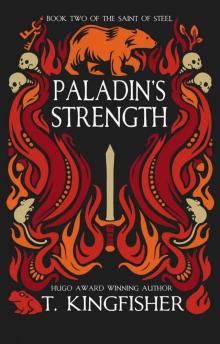 Paladin's Strength
Paladin's Strength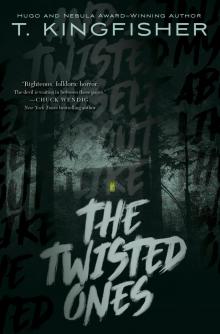 The Twisted Ones
The Twisted Ones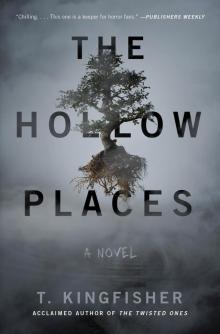 The Hollow Places
The Hollow Places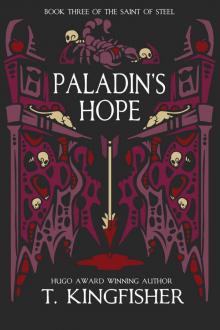 Paladin’s Hope: Book Three of the Saint of Steel
Paladin’s Hope: Book Three of the Saint of Steel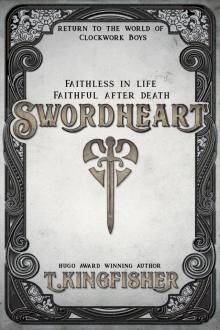 Swordheart
Swordheart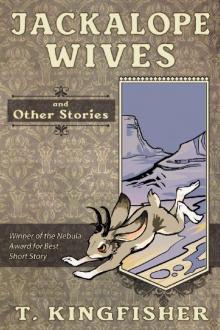 Jackalope Wives And Other Stories
Jackalope Wives And Other Stories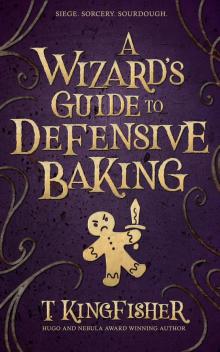 A Wizard's Guide to Defensive Baking
A Wizard's Guide to Defensive Baking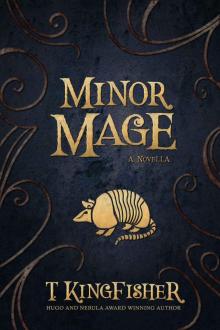 Minor Mage
Minor Mage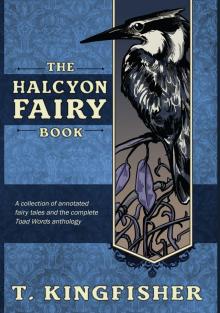 The Halcyon Fairy Book
The Halcyon Fairy Book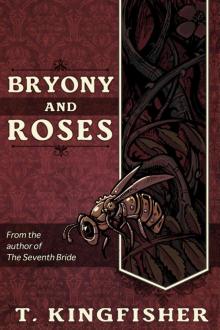 Bryony and Roses
Bryony and Roses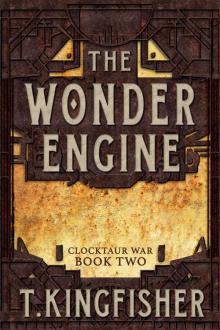 The Wonder Engine_Book Two of the Clocktaur War
The Wonder Engine_Book Two of the Clocktaur War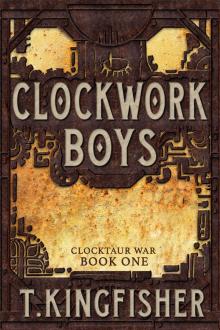 Clockwork Boys: Book One of the Clocktaur War
Clockwork Boys: Book One of the Clocktaur War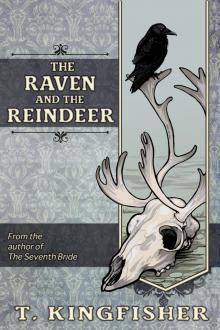 The Raven and the Reindeer
The Raven and the Reindeer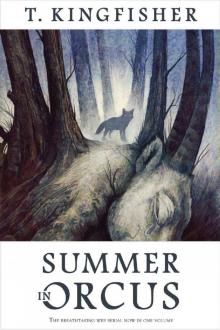 Summer in Orcus
Summer in Orcus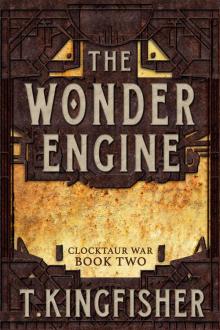 The Wonder Engine
The Wonder Engine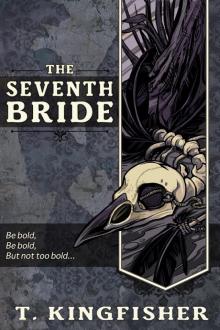 Seventh Bride
Seventh Bride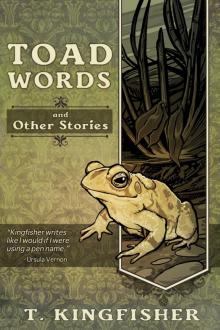 Toad Words
Toad Words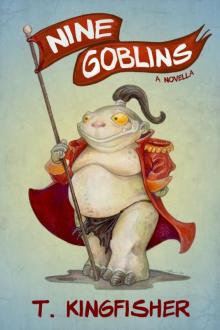 Nine Goblins
Nine Goblins